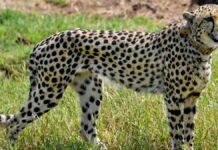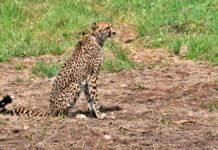
Key Points:
- Three male cubs of cheetah Asha now hunting independently at 14 months old
- Cubs spending most time away from mother, establishing own territories
- Total of 12 cheetahs currently roaming free in Kuno National Park
- Milestone marks significant progress in India’s cheetah reintroduction program
In a major breakthrough for India’s ambitious cheetah reintroduction project, the three male cubs born to Namibian cheetah Asha in Kuno National Park have achieved a crucial milestone. At just 14 months old, these young predators have begun hunting independently, showcasing their adaptability to their new Indian habitat.
Cubs Embrace Independence
Chief Conservator of Forests (CCF) Uttam Kumar Sharma confirmed that the trio of male cubs are now successfully hunting on their own within the park. This development is particularly noteworthy as it comes earlier than expected, with cheetah cubs typically relying on their mother for up to 18 months in the wild.
Divisional Forest Officer (DFO) R Thirukkural elaborated on the cubs’ newfound independence, stating that field staff have observed the young cheetahs spending most of their time away from their mother, Asha. This behavior indicates that the cubs are not only physically capable of hunting but are also developing the confidence to explore and establish their own territories within Kuno.
A Growing Cheetah Population
The success of these cubs is a significant boost to the cheetah population in Kuno National Park. Currently, 12 cheetahs are roaming free in the protected area, including adults and sub-adults. Each of these big cats is carving out its own niche within the park’s diverse landscape.
Project Cheetah: A Journey of Ups and Downs
This positive news comes after a series of challenges faced by Project Cheetah since its inception in September 2022. The project has seen both triumphs and setbacks, including the loss of adult cheetahs and some cubs. However, the birth of multiple litters and now the successful transition of these cubs to independent hunting mark significant strides forward.
Looking Ahead: Conservation Implications
The ability of Indian-born cheetah cubs to hunt independently is a crucial indicator of the project’s potential long-term success. It suggests that the cheetahs are adapting well to the local prey base and environmental conditions of Kuno National Park.
As these young cheetahs continue to grow and potentially establish their own territories, conservationists will be watching closely. Their success could pave the way for a stable, self-sustaining cheetah population in India a dream that seemed impossible just a few years ago.
With continued monitoring and protection, Kuno’s cheetahs may well become the cornerstone of cheetah conservation in Asia, marking a new chapter in the species’ history on the subcontinent.


















































